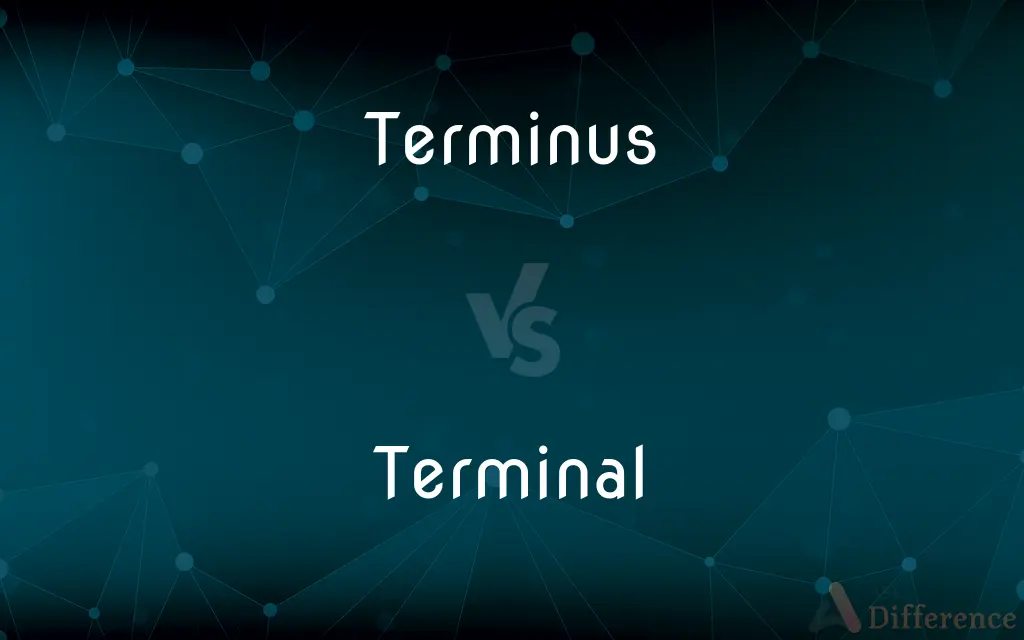Terminus vs. Terminal — What's the Difference?
By Tayyaba Rehman & Maham Liaqat — Updated on March 27, 2024
Terminus refers to the final point or end of a transportation line, while a terminal is a facility at such a point for passengers or goods.

Difference Between Terminus and Terminal
Table of Contents
ADVERTISEMENT
Key Differences
Terminus is traditionally used to describe the end point of a transportation route, like a railroad or bus line, emphasizing the concept of a final destination. It is often associated with the last station on a line, where the journey concludes. This term highlights the physical end point of a route, suggesting a boundary beyond which the service does not extend. Termini are significant in planning and operating transportation networks, serving as pivotal points for route designation and service planning. On the other hand, a terminal can refer to the infrastructure and facilities located at a terminus or key points along a route, including buildings, platforms, and equipment for handling passengers, luggage, and freight. Terminals are designed to facilitate the boarding, alighting, and transfer of passengers, as well as the loading and unloading of goods. They can exist not only at the end of transportation lines but also at intermediate points, serving as hubs for various transportation modes.
While "terminus" emphasizes the geographic or operational endpoint of a route, "terminal" focuses on the functionality and services provided at such points. For instance, bus terminals and airport terminals are equipped with amenities to accommodate travelers' needs, such as ticket counters, waiting areas, and concessions. This distinction underlines the difference between the conceptual end of a route and the physical structures that support transportation systems.
The usage of these terms can vary depending on the context and the specific transportation mode being discussed. In rail transportation, "terminus" is commonly used to denote the last station, whereas in air travel, "terminal" is frequently applied to describe the passenger processing buildings. This reflects the broader applicability of "terminal" across various types of transport facilities, including seaports, airports, and bus stations.
The choice between "terminus" and "terminal" can also indicate the scope of discussion, whether focusing on the route's endpoint or the facilities provided for passengers and goods. Understanding this distinction is crucial for accurate communication in the context of transportation and logistics planning, design, and management.
Comparison Chart
Definition
The final point or end of a transportation line
A facility at the end point or along a route for handling passengers or goods
ADVERTISEMENT
Focus
Geographic or operational endpoint of a route
Infrastructure and facilities for transport services
Associated With
End of the route, boundary of service
Passenger and freight handling, amenities
Usage
Commonly used in rail and bus transportation
Used across all transportation modes, including air, sea, and land
Contextual Meaning
Emphasizes the concept of finality in a route
Focuses on the functionality and services provided
Compare with Definitions
Terminus
Often used to describe the endpoint in route planning.
Planners designated a new terminus to accommodate the expanding city.
Terminal
A facility for passengers or goods at a transportation hub.
The airport terminal was bustling with travelers from around the world.
Terminus
The final station on a transportation route, such as a railway or bus line.
The train reached its terminus, marking the end of our journey.
Terminal
Equipped with amenities for travel, including ticket counters and waiting areas.
The new bus terminal offers comfortable seating and Wi-Fi access.
Terminus
Historically signifies the end point of long-distance travel routes.
The ancient city's gates served as a terminus for several trade routes.
Terminal
Can exist not only at end points but also as transfer hubs.
The ferry terminal serves as a key transfer point between the islands.
Terminus
Reflects the physical or operational endpoint of a route.
The shuttle's terminus is at the university's main entrance.
Terminal
Integral to the functionality of transportation networks.
Upgrades to the terminal facilities improved passenger flow significantly.
Terminus
Can denote the last stop or boundary of a service area.
The bus company announced a new terminus for its coastal line.
Terminal
Reflects the emphasis on service and infrastructure in transportation.
The cargo terminal handles thousands of tons of freight daily.
Terminus
The end of a railway or other transport route, or a station at such a point; a terminal.
Terminal
Forming or situated at the end or extremity of something
The terminal tip of the probe
A terminal date
Terminus
A final point in space or time; an end or extremity
The exhibition's terminus is 1962
Terminal
Done or occurring each school, college, university, or law term
Terminal examinations
Terminus
A figure of a human bust or an animal ending in a square pillar from which it appears to spring, originally used as a boundary marker in ancient Rome.
Terminal
The end of a railway or other transport route, or a station at such a point
A freight terminal
A ferry terminal
Terminus
The final point; the end.
Terminal
A point of connection for closing an electric circuit
Battery terminals
Terminus
An end point on a transportation line or the town in which it is located.
Terminal
A device at which a user enters data or commands for a computer system and which displays the received output.
Terminus
A boundary or border.
Terminal
Another term for terminus (sense 3 of the noun)
Terminus
A stone or post marking a border.
Terminal
A patient suffering from a terminal illness.
Terminus
The end or final point of something.
Terminal
Of, at, relating to, or forming a limit, boundary, extremity, or end
The terminal moraine of a glacier.
Terminus
The end point of a transportation system, or the town or city in which it is located.
Terminal
(Botany) Growing or appearing at the end of a stem, branch, stalk, or similar part.
Terminus
A boundary or border, or a post or stone marking such a boundary.
Terminal
Of, at, relating to, or being the end of a section or series; final.
Terminus
Literally, a boundary; a border; a limit.
Terminal
A building in an airport where passengers transfer from ground transportation to the facilities that allow them to board airplanes.
Terminal 1 is for domestic flights, whereas Terminal 2 is for international flights.
A shuttle service runs free of charge between the three terminals.
Terminus
The Roman divinity who presided over boundaries, whose statue was properly a short pillar terminating in the bust of a man, woman, satyr, or the like, but often merely a post or stone stuck in the ground on a boundary line.
Terminal
A harbour facility where ferries embark and disembark passengers and load and unload vehicles.
Terminus
Hence, any post or stone marking a boundary; a term. See Term, 8.
Terminal
A rail station where service begins and ends; the end of the line. For example: Grand Central Terminal in New York City.
Terminus
Either end of a railroad line; also, the station house, or the town or city, at that place.
Terminal
A rate charged on all freight, regardless of distance, and supposed to cover the expenses of station service, as distinct from mileage rate, generally proportionate to the distance and intended to cover movement expenses.
Terminus
A place where something ends or is complete
Terminal
A town lying at the end of a railroad, in which the terminal is located; more properly called a terminus.
Terminus
The ultimate goal for which something is done
Terminal
A storage tank for bulk liquids (such as oil or chemicals) prior to further distribution.
Terminus
(architecture) a statue or a human bust or an animal carved out of the top of a square pillar; originally used as a boundary marker in ancient Rome
Terminal
(electronics) the end of a line where signals are either transmitted or received, or a point along the length of a line where the signals are made available to apparatus.
Terminus
Either end of a railroad or bus route
Terminal
An electric contact on a battery.
Terminus
Station where transport vehicles load or unload passengers or goods
Terminal
(telecommunications) The apparatus to send and/or receive signals on a line, such as a telephone or network device.
Terminal
(computing) A device for entering data into a computer or a communications system and/or displaying data received, especially a device equipped with a keyboard and some sort of textual display.
Terminal
(computing) A computer program that emulates a physical terminal.
Terminal
(computing theory) A terminal symbol in a formal grammar.
Terminal
(biology) The end ramification (of an axon, etc.) or one of the extremities of a polypeptide.
Terminal
Appearing at the end; top or apex of a physical object.
Terminal
Occurring at the end of a word, sentence, or period of time, and serves to terminate it
Terminal
(archaic) Occurring every term; termly.
A student's terminal fees
Terminal
To store bulk liquids (such as oil or chemicals) in storage tanks prior to further distribution.
Terminal
Of or pertaining to the end or extremity; forming the extremity; as, a terminal edge.
Terminal
Growing at the end of a branch or stem; terminating; as, a terminal bud, flower, or spike.
Terminal
Pertaining to a railroad terminal; connected with the receipt or delivery of freight; as, terminal charges.
Terminal
That which terminates or ends; termination; extremity.
Terminal
Either of the ends of the conducting circuit of an electrical apparatus, as an inductorium, dynamo, or electric motor, usually provided with binding screws for the attachment of wires by which a current may be conveyed into or from the machine; a pole.
Terminal
The end of a line of railroad, with the switches, stations, sheds, and other appliances pertaining thereto.
Terminal
The station at either end of a bus line line which transports freight or passengers.
Terminal
A station where passenger buses start or end a trip; - also called bus terminal.
Terminal
The structure at an airport where passengers board or debark, and where ticket purchases and baggage pickup is performed; - also called airline terminal.
Terminal
An electronic device where data may be entered into a computer, and information received from it, usually consisting of a keyboard and video display unit (monitor); the terminal may be integrated or connected directly to a computer, or connected by a communications circuit with a computer at a remote location; - also called computer terminal.
Terminal
Station where transport vehicles load or unload passengers or goods
Terminal
A contact on an electrical device (such as a battery) at which electric current enters or leaves
Terminal
Electronic equipment consisting of a device providing access to a computer; has a keyboard and display
Terminal
Being or situated at an end;
The endmost pillar
Terminal buds on a branch
A terminal station
The terminal syllable
Terminal
Of or relating to or situated at the ends of a delivery route;
Freight pickup is a terminal service
Terminal charges
Terminal
Relating to or occurring in a term or fixed period of time;
Terminal examinations
Terminal payments
Terminal
Occurring at or forming an end or termination;
His concluding words came as a surprise
The final chapter
The last days of the dinosaurs
Terminal leave
Common Curiosities
Can a transportation route have multiple termini?
Yes, a route can have multiple termini, especially in loop or branching services, where different branches may end at different points.
Can a terminal exist away from a terminus?
Yes, terminals can exist at any key point in a transportation network, not just at the end points.
Is "terminus" only used for trains and buses?
While commonly associated with rail and bus transportation, "terminus" can refer to the end point of any transportation route.
Why are airport buildings called terminals?
Airport buildings are called terminals because they facilitate the handling of passengers and cargo, serving as critical infrastructure for air travel.
Can the terms "terminus" and "terminal" be used interchangeably?
While related, they are not fully interchangeable as they emphasize different aspects of transportation endpoints.
How has the concept of a terminus evolved with modern transportation?
With modern transportation, the concept of a terminus has expanded to include complex networks with multiple end points and integrated terminal facilities.
Are there environmental considerations in terminal design?
Yes, sustainable design and operation are increasingly important in terminal development, focusing on reducing environmental impact.
What is the difference between a terminus and a terminal?
A terminus is the final point on a transportation route, whereas a terminal is the facility used for passenger or goods handling at that point or along the route.
How does the design of a terminal affect transportation?
Terminal design impacts the efficiency of passenger and cargo flow, affecting overall transportation efficiency and user experience.
Can the term "terminal" refer to technology?
Yes, in other contexts, "terminal" can refer to computer terminals or other points of access to a network or system.
What role do terminals play in global logistics?
Terminals are crucial in global logistics, acting as nodes that facilitate the transfer, storage, and distribution of goods.
What technological advancements affect terminals today?
Technological advancements in automation, security, and information systems significantly impact terminal operations and efficiency.
Are all termini equipped with terminals?
While most termini have some form of terminal facilities, the extent and sophistication can vary widely based on location and service requirements.
How do cultural differences influence the design of terminals?
Cultural considerations can influence terminal design, reflecting local architectural styles, passenger behaviors, and service expectations.
How do termini and terminals impact urban development?
Termini and terminals often serve as catalysts for urban development, attracting businesses and influencing land use patterns.
Share Your Discovery

Previous Comparison
Label vs. Badge
Next Comparison
Frugal vs. MiserAuthor Spotlight
Written by
Tayyaba RehmanTayyaba Rehman is a distinguished writer, currently serving as a primary contributor to askdifference.com. As a researcher in semantics and etymology, Tayyaba's passion for the complexity of languages and their distinctions has found a perfect home on the platform. Tayyaba delves into the intricacies of language, distinguishing between commonly confused words and phrases, thereby providing clarity for readers worldwide.
Co-written by
Maham Liaqat












































